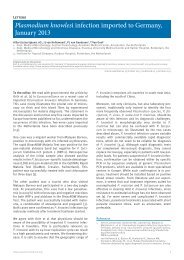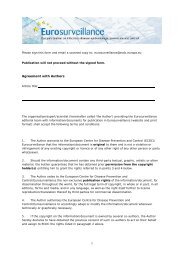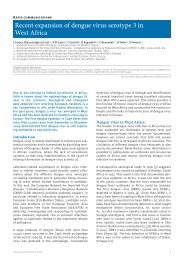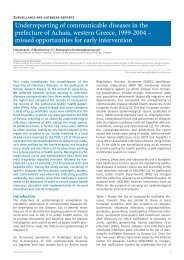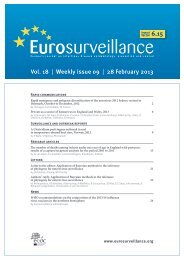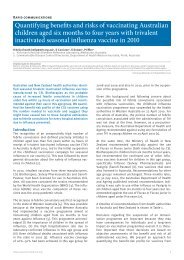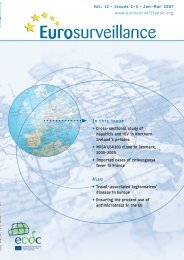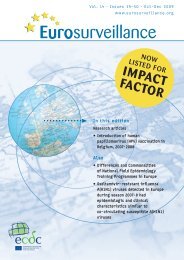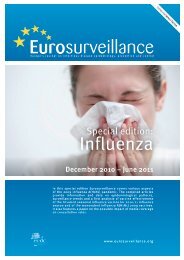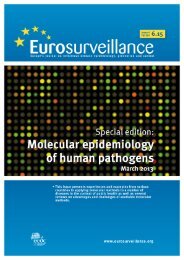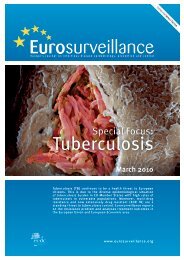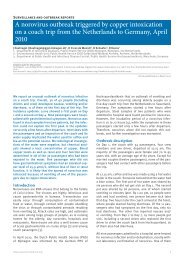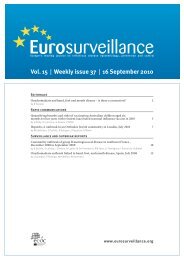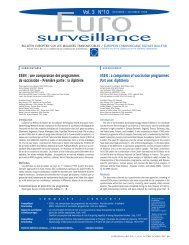In this edition Also - Eurosurveillance
In this edition Also - Eurosurveillance
In this edition Also - Eurosurveillance
Create successful ePaper yourself
Turn your PDF publications into a flip-book with our unique Google optimized e-Paper software.
Table 1<br />
HARMONY <strong>In</strong>ternational Union of Microbiology Societies (IUMS) typing laboratory network participants<br />
Participants Organisation Country<br />
G. Coombs (Resistotyping lead) Royal Perth Hospital, Perth Australia<br />
M. Struelens, A. Deplano<br />
R. de Ryck<br />
Hôpital Erasme - Centre for Molecular Diagnostic (CMD), Brussels Belgium<br />
R. Skov, V. Fussing (to 2002) Statens Serum <strong>In</strong>stitut, Copenhagen Denmark<br />
B. Cookson (Co-Ordinator), A. Lynch, S. Murchan,<br />
P. Kaufmann<br />
S. Salmenlinna,<br />
J. Vuopio-Varkila<br />
(Ribotyping lead)<br />
Laboratory of Healthcare Associated <strong>In</strong>fection, Health Protection Agency, London England<br />
National Public Health <strong>In</strong>stitute, Department of Bacteriology, Helsinki Finland<br />
N. El Solh (deceased) <strong>In</strong>stitute Pasteur, Paris France<br />
W. Witte, C. Cuny Robert Koch <strong>In</strong>stitute, Wernigerode Branch, Wernigerode Germany<br />
P.T. Tassios, N.J. Legakis National and Kapodistrian University of Athens, Athens Greece<br />
A. Rossney , B. O’Connell National MRSA Reference Laboratory, St James’s Hospital, Dublin Ireland<br />
W. Hryniewicz National Medicines <strong>In</strong>stitute, Warsaw Poland<br />
D. Morrison Microbiology Department, Stobhill Hospital, Glasgow Scotland<br />
M. Mueller-Premru University of Ljubljana, Medical Faculty, Ljubljana Slovenia<br />
J. Garaizar Dept. Immunol., Microbiol. y Parasitol., F. Farmacia, UPV/EHU, Vitoria-Gasteiz Spain<br />
A. Vindel Centro Nacional de Microbiología, <strong>In</strong>stituto de Salud Carlos III, Madrid Spain<br />
S. Hæggman, B. Olsson-Liljequist Swedish <strong>In</strong>stitute for <strong>In</strong>fectious Disease Control, Solna, Sweden<br />
A. van Belkum<br />
W. van Leeuwen<br />
(Binary typing lead)<br />
Table 2<br />
Criteria for referral of isolates to a typing laboratory<br />
Erasmus MC, Center, Rotterdam The Netherlands<br />
<strong>In</strong>troductory statement<br />
To enable us to maintain our current low turn round times and improve the quality of the service, please:<br />
1) Request typing only if you intend to act upon the results.<br />
2) Ensure that the Consultant Microbiologist and/or <strong>In</strong>fection Control Team have confirmed there are good reasons for submission.<br />
3) For all requests, state hypothesis to be tested, i.e. how typing will make a difference.<br />
4) If in any doubt contact us and ask.<br />
5) <strong>In</strong> outbreaks (“a temporal and spatial cluster above the normal baseline”) please send the minimum number of isolates needed to inform local practice<br />
(<strong>this</strong> should rarely be more than half), and store temporally related isolates.<br />
6) Give priority to isolates that cause invasive or serious infection during the course of an outbreak, but avoid sending multiple isolates from single<br />
patients or environmental isolates, without discussion with us.<br />
7) Wherever possible, use surrogate markers such as biochemical tests e.g. urease and antimicrobial resistances and include representative isolates with<br />
significantly different phenotypes e.g. in antibiotic susceptibilities, pigmentation and/or haemolysis.<br />
8) <strong>In</strong> endemic situations (“where a hospital is constantly challenged with MRSA in patient re-admissions and inter-hospital transfers”), if surrogate markers<br />
are being used to identify any locally endemic strains we are willing to check a few representative isolates for you from time to time, e.g. five isolates<br />
every six months.<br />
9) Toxic shock and endocarditis. We would like to receive an isolate from every case of suspected staphylococcal toxic shock and endocarditis for toxintesting<br />
and MIC testing respectively.<br />
10) Anomalous isolates.Please state the anomaly/resistance to be investigated eg slide coagulase negative MRSA, and please check for mixed culture, coagulase,<br />
catalase and Gram stain before sending.<br />
11) Antibiotic resistance.<br />
Request antibiotic susceptibility tests only when necessary to assist your local studies, e.g. anomalous or doubtful test results, unusual or clinically<br />
significant results, necessary quantitation (e.g. MIC of first encountered mupirocin-resistant isolates), unexpected resistance e.g. to vancomycin).<br />
162 EUROSURVEILLANCE Vol. 13 · Issues 14–26 · Apr–Jun 2008 · www.eurosurveillance.org



